|
Bel Walton wins Regent’s writing competition
How much do you know about dolphins?

Competition winner Bel Walton
receiving her certificate.
The English Department at The Regent’s School organized a
‘Save the Dolphins’ research week for years 7, 8 and 9. Students and staff
at The Regent’s School were inspired to help raise awareness of the capture
and training of dolphins for captivity after the star of the movie
documentary ‘The Cove’, Ric O’Barry, visited the school last term.
Students took part in a range of research activities
designed to provide them with accurate, yet sometimes harrowing, information
surrounding the capturing and training of dolphins used for entertainment in
aquariums around the world. Impassioned and outraged by their discoveries,
Regent’s students set to work on writing articles and designing posters with
the intention of providing Pattaya’s general public with an informed
perspective on the topic.
Over 120 students entered a competition to have their
article published and contribute to raising awareness of ‘Ric O’Barry’s
Dolphin Project’ campaign.
Here is the winning article: “How much do you know about
dolphins?” by Bel Walton, Year 7.
People often wonder whether there is life out there in
space. Whether there is another race, with the brains of a human. But those
people are barking up the wrong tree. What if there was a race down here on
Earth? What if there was an animal evolving with brains that could compete
with that of a human? What if 1,000,000 years from now the Earth was ruled
not by man, but the humble dolphin. The possibility is there.
Dolphins are an incredible species! Their intelligence is
amazing. Not only do they have a language of their own, they also have a
structure of society. Very much like humans, they must work hard, and find
their place in the world. They also have clever hunting strategies, from
using tools, to laying bait for traps. Another thing that humans and
dolphins have in common, is personal and individual identification. This
means that if their calf is being murdered before their very eyes, they know
it, they feel it. On many an occasion, they have saved the lives of humans,
when there’s been a shark attack, or someone is drowning.
Dolphins today face one major danger. The human. They say
that about 20,000 dolphins die every year. A caught dolphin is a dead
dolphin, whether they are murdered for meat, or sold to a Dolphinarium for
entertainment. During the capture, boats with metal poles sticking out of
the bottom, will be banged on the top with hammers to create a wall of
sound. Dolphins, being sonar animals are thrown into a state of panic and
are easily herded into a bay or cove. Their trainers pick out the ones they
want (usually the young females), and have them taken away. The remaining
animals are then massacred. One of the most shocking facts about this is
that they are not even killed in a quick, systematic fashion. Instead, sharp
poles are plunged into the water, piercing the skin of the dolphins, causing
them to splash around in agony. By the end of the day, the sea is red with
blood. Male, female and young. All dead. How can we call ourselves the upper
life-form, yet still murder these innocent animals who have never done
anything, but help us? An example of this type of massacre is in Taiji,
Japan. There is a documentary on it called ‘The Cove’, starring Ric O’Barry,
a dolphin activist.
There are people in the world who eat dolphin meat.
Mostly, these people don’t know about the murder. And even those who do,
usually don’t know about how dangerous it is. Dolphins contain the same
levels of mercury as humans do. Their meat contains 5 times the maximum
advised amount of mercury in food. The Mercury eats at your brain cells, and
can result in the births of deformed children and worse. “If you’re eating
dolphin meat, you’re eating poison, and if you’re eating a lot of dolphin
meat, you’re eating a lot of poison,” - Louis Psihoyos (“The Cove”
director).
Now that you’ve heard about the dolphin murders, you must
think that the dolphins that get sold are lucky. Well you’re wrong. In fact,
in some cases, they’re worse off. Being sonar, dolphins are sensitive to
sound. When they’re performing, the shouts and chatter of the audience,
mixed with the boom of the music inflicts a lot of stress on them. The
stress can kill them. Also, the fact that many of them have seen their
family killed can add to the stress and depression. Most dolphins in
dolphinariums do not die of old age, but of stress or injuries due to
capture or cruelty. In some places, the dolphins are not very well treated,
and can often be found living in pools of their own urine and waste. “The
dolphin smile is nature’s greatest deception.” - Ric O’Barry.
As sad as it is, at least there are people out there
trying to make a difference. Ric O’Barry is one of these people. Since
having Cathy, the dolphin that he trained, die in his arms, Ric has set out
to release all captive dolphins. If you would like to support his campaign,
go to www.takepart.com/cove.
Other organizations who support the dolphins are: Animal
Welfare Institute, Earth Island, Humane Society of the United States, In
Defense of Animals, Ocean Alliance, Oceanic Preservation Society, Off the
Mat Into the World, Save Japan Dolphins, and The Whaleman Foundation.
The world is ruled by humans. We can determine which
animals live and which die out. At the moment there is a fair chance that
dolphins will become extinct. Whether they do or not is up to us. There is a
new dolphinarium being built here in Pattaya. Do your part and join the
campaign to stop it. Because at this rate, we will never find out what
dolphins can really do.
|
|
 |
Yamaha Young Talent
Competition kicks off Feb. 5

Young women perform a dance
routine at the press conference for the upcoming Yamaha Young Talent
Competition 2012.
Manoon Makpol
Hundreds of children and teens are expected to vie for
scholarships and music lessons when the Yamaha Pattaya Young Talent
Competition begins again Feb. 5.
The contest, sponsored by the Yamaha Music Institute and
the Tiffany Show, will see children and teens compete in six categories in
hopes of winning the HRH Princess Soamsawalee trophy, cash, discounts and
singing or dancing lessons.
Alisa Phanthusak, assistant managing director of the
Tiffany Show, and representatives from Central Festival Pattaya Beach,
Y.W.C.A. Bangkok-Pattaya Center, Yamaha and the Lions Club of Pattaya
announced Jan. 14 that the opening round of the annual contest will be held
Feb. 5 at Yamaha’s Pattaya music school from 9 a.m. to 8 p.m.
Categories include singing of Thai country songs for
children under 12 and teens 13-18, Thai or international pop songs for both
age groups, a band category for which organizers have already selected 20
semi-finalists, and Japanese or Korean pop dance category.
Winners in each category will receive cash and prizes
from 2,000-10,000 baht.
Interested students can apply from today till Jan 31. Go
to www.pattayafahmai .com to download an application form, and send the
completed form by email to siamkolkarnpattaya@hotmail. com, or apply in
person at Siam Kolkarn Musical School on 3rd Road or Tantrarak School in Soi
Paniadchang, or at any of the Pattaya City schools.
On Sunday, February 26, all selected names will be
announced for the last round, which begins with a grand rehearsal at
Tiffany’s Theatre on Saturday, March 10 and ends with the finals on Sunday,
March 11, at Tiffany’s Theatre.
|

|
Tache for Cash helps flood victims
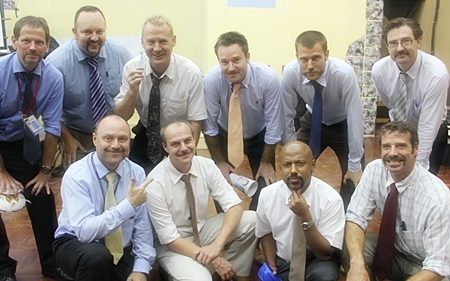
Garden’s brave teachers grew mammoth
moustaches to help flood victims.
James Watkins,
GIS primary teacher
Teachers at Garden International School helped raise
more than 27,000 baht to help Thailand’s flood victims with a variety of
weird and wonderful moustaches!
People throughout Thailand and, indeed the world,
watched as the floods caused such widespread destruction across huge
parts of the nation. The staff at Garden International School were no
exception. They, like so many others, wanted to help. A mufti
(non-uniform) day followed, raising over 20,000 baht, but it was felt
that more could be done.
A number of the male teachers from the school in Ban
Chang, Rayong, had already been talking about Movember, a charity
moustache-growing event which aims to raise money for, and increase
awareness of, men’s health issues. It was decided that these 11 men
would take part in this event, but raise money to help flood victims
instead.
The morning of November 1 brought with it the last
full shave, and there was much excitement among the teachers. A week
later, once moustaches had begun to emerge and questions were being
asked by the students, the Movember campaign was formally launched, with
an introductory video, which included images of the floods and some
mocked-up pictures of what the teachers might look like at the end of
the month. The twist in this particular campaign was that the teacher
who had had the most money donated to them at the end of the month would
have to keep their moustache until the end of the term.
Donations came in thick and fast that very same day
and, helped by weekly graphical updates of the contest, continued coming
in throughout the month. What had started as a fun activity for our 11
mustachioed heroes soon became fiercely competitive, as the realities of
moustache cultivation began to set in. Itchy, hot upper lips and
increased morning shaving times followed, in a whole range of styles,
from the refined “Errol Flynn”, to the classic “Tom Selleck”, via the
“El Bandito”, to the “Victorian Policeman”.
Gamesmanship abounded in the final few days, with the
top spot changing hands many times. In the end the early favourite, EAL
and Drama teacher Mr Ken, fresh from the recent production of “Mamma
Mia!”, nudged ahead by a whisker. He will now be sporting a moustache
until the end of the term.
In total, 27,170 baht was raised for the victims of
the floods and everyone, except, for the time being Mr Ken, is enjoying
a well deserved shave!
|

|
Rotary program helps orphans learn English Down Under
Australian Embassy and Thai Airways assist to make dreams real
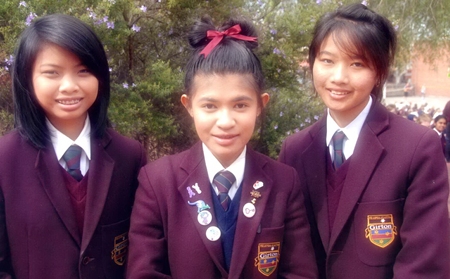
Pattaya residents Krisana
Dahtong, Arunee Boonchuay and Thipparat Chop-prao at Griton Grammar
School. All three have received scholarships to continue studying in
Australia.
Derek Franklin
In an ideal world every student in Thailand would
receive English classes taught by qualified and experienced native
English speakers, classes would start at an early age, and by grade nine
each and every student in Thailand would be fluent.
However, the reality at present is that the majority
of students in government schools, and many in private schools, are
taught English by teachers who themselves may not have much exposure to
the language.
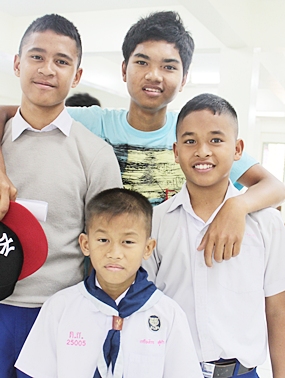
Mick, center, back at
home in Pattaya.
Many students leave school with the ability to read
and write English, but they may not be able to understand what they have
written or what they are reading. Their conversation skills are poor and
once away from the classroom many will not have the time or resources to
continue learning the language.
Immersion in a language is the best way to learn.
Everyday practice will build confidence, which in turn will lead to the
student becoming more proficient, but this is not possible for everyone.
Since 2004 teenagers from two Thai organisations, the
Pattaya Orphanage and the Father Ray Children’s Home, have each spent
time in the Australian city of Bendigo, living with local Australian
families and attending the local Girton Grammar School.
The Rotary Orphan Student Exchange (R.O.S.E.) program
was initially organised by the Rotary Club of Eaglehawk in Bendigo,
Australia together with the Rotary Club of Jomtien-Pattaya, the
involvement of the Australian Embassy and Thai Airways International
have ensured that bureaucracy and costs are kept to a minimum.
Traveling to Australia, experiencing a different
culture, moving into a house full of strangers and enrolling at a new
school is a big upheaval for any teenager. But the support the Thai
students receive from the school and their host families ensures that
few problems arise.
Sixteen year old Mick Tohcham has recently returned
from Australia and has fond memories of his time down under.
After saying farewell to his friends in Pattaya, Mick
boarded his Thai Airways flight for the nine hour journey to Melbourne
where he was met by his new family.

Mick, second left middle
row, with his classmates at Girton Grammar School.
He lived with a local Australian couple, whose own
four children were all away at university. He settled into school and
learned to love the food, including fish and chips.
On his first day at Girton Grammar School Mick was
asked to stand in front of two hundred and fifty fellow students and
tell his story. “I was very nervous as I could not speak English very
well,” Mick remembers, “but a month later my English had improved so
much that when they asked me again to tell my story I was not nervous at
all.”
Trips to the local Thai restaurant were a treat, but
as Mick said, “Thai food in Australia is not the same as back home.”
His passion for football saw him being selected for
the school’s team, and it was at one match that a scout noticed Mick’s
skills with a ball and he was quickly signed to a local team.
Now back in Pattaya, Mick is waiting for the new
school year to start in May. In the meantime he will be putting his new
found skills to use. Working in a foreign owned restaurant, dealing
everyday with foreign customers whose common language is English can
only give him more confidence.
While most teenagers have returned to Thailand after
one year, three students have received scholarships which mean that they
will continue their studies at college and university in Australia.
Arunee Boonchuay was seventeen when she said farewell
to her friends, and four years later she is still in Bendigo. She
received a scholarship to continue studying in Australia and later this
year she is planning to enroll at the prestigious La Trobe University
where she will study architecture.
Travelling over to foreign countries is not a
possibility for most Thai students. The lucky ones get to make the most
of their opportunity to learn a language, experience a new culture and
gain new skills.
For those Thai students who want to improve their
language skills but do not have the chance to travel overseas, Mick has
some advice for learning a language: “Many students say they want to
learn English but are too lazy. But if you really want to learn to speak
better English you need to practice every day so that you feel more
confident.”
More information can be found at www.fr-ray.org
|

|
Nigel helps Ban Pak Rak Puen

Occasionally, something out of the ordinary happens
which brings a big smile to your face.
In December, Pattaya Sports Club donated supplies to
Ban Pak Rak Puen, an event that was widely reported in the Pattaya
newspapers. I was having lunch with some friends when I had a call from
‘Nigel’? I didn’t know him but he had seen the articles in the
newspapers and was so impressed that he made the decision to help the
home by donating 10,000 baht for whatever was needed.

Not being one to miss an opportunity to help those in
need, the funds were quickly spent on items that would make life a
little more comfortable for the residents: soap, shampoo, skin cream,
fans; everyday items that most of us take for granted.
We were also in a position to provide some clothing
which has been kindly donated by members of PSC for distribution to the
underprivileged. If you have clothes that you are not using, don’t throw
them away, drop them into the PSC office and we will take care of the
rest.
Nigel Oakes comes from Manchester and has been
visiting Pattaya for 12 years. Like many of us, after 6 years realised
that everything that he needed was right here in Pattaya and decided to
stay. The funds for the above were obtained from his friends and family
back in UK who gave generously for Nigel to distribute as he saw fit.
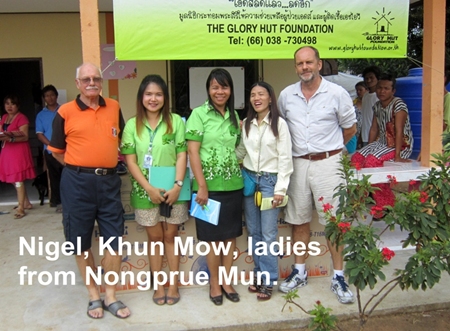
|

|
Rangsit University international exchange students visit Royal Cliff
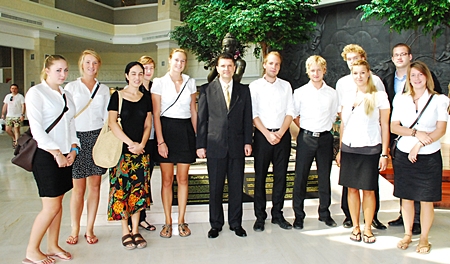
Royal Cliff Hotels Group General Manager
Joachim Grill welcomes Rangsit University International Exchange
students from The Netherlands at the Royal Cliff Beach Hotel.
On January 16, eleven students from the Netherlands
participating in Rangsit University’s International Exchange Program
visited Royal Cliff Hotels Group for an educational seminar and site
inspection. On hand to greet the students and accompanying faculty
members was Royal Cliff Hotels Group general manager, Joachim Grill.
Royal Cliff Hotels Group executive director, Vitanart
Vathanakul, spent the morning delivering a detailed seminar on the
events management aspect of the hospitality industry. During this
informative session the university students learned how to organize,
coordinate and execute a successful event and were taught the standards
of service expected of a 5-star property.
After the seminar the students were guided through a
site inspection of the property by the Royal Cliff events team. Resident
manager of PEACH (Pattaya Exhibition And Convention Hall) Michael Goh
introduced the students to the fundamentals and essentials of PEACH, a
flagship of the Royal Cliff Hotels Group.
The students and faculty ended their tour with a
lunch at Panorama, overlooking the stylish Inifi Pool where they enjoyed
a traditional Thai meal.
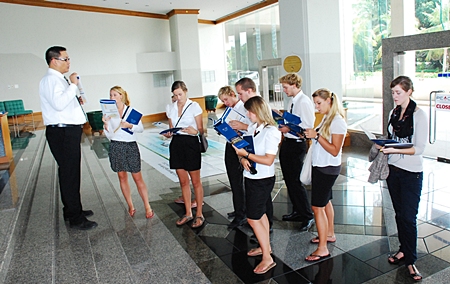
PEACH Resident Manager
Michael Goh introduces the students to the fundamentals and essentials
of PEACH.
|

|
|

